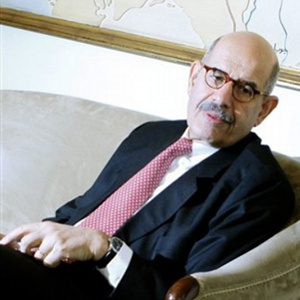E for Egypt, E for ElBaradei

Seventeen months have to pass before Egypt holds the presidential election, but Arab media are full of news about political campaigns in the land of pharaohs. Mubarak clan and their advanced oppression system commanded by Gen. Omar Soleyman are still strangleholding the society with state of emergency banning the assembly of more than five people announced 30 years ago to continue the rule of terror in this ancient country. Among all major and minor developments, suddenly it is the veteran ElBaradei who rises to the stage, not only distressing Mubarak and sending him to Germany, but also ringing the alarm for Gamal, the ambitious son.I n absence of his father, Gamal Mubarak’s hasty decisions are fine proof of the confusion inside police system of the regime.
Release of Muslim Brotherhood high-ranking members, Mahmoud Ezzat, first deputy, Essam El-Erian, speaker of the group and Abdul-Rahman Al-Barr and Mohyee Hamed and inability of the oppression machine to stop gatherings of ElBaradei’s supporters in his visits around the country may give us a better picture of the situation inside Mubarak’s intelligence service. Egyptians’ craving to throw off the repressive security system plus ElBaradei’s quick perception of this fact are leading him in a track which according to some Egyptian political observers sooner or later will end in his expulsion or assassinaion.
Since 1981 and assassination of President Anwar Sadat, militaristic system has quenched any potential voice of opposition in the country. Nevertheless, today it has faced a movement whose oppression would be painstaking, if not impossible. ElBaradei is talking of things banned for years by censorship machine of Husni Mubarak. Now with those words actually coming out of his mouth, there are no more chances for the Mubarak regime to make an ultimate decision that could help them get rid of this 67-year old potential candidate.
ElBaradei February visit to Egypt was said to be only for testing the waters, but recent developments prove that former IAEA chief has already made his mind and the nightmare has started for Mubarak and his son. A frail economy in which even bread is rationed, aggravated by rampant corruption, backstage political deals, mistrust between government and citizens, submission to US pressures –while according to a survey over 90 percent of Egyptians dislike the American government, weakness in political and security relations with Israel (in cases such as cooperation with Tel Aviv in the 22-day attack on Gaza), widespread poverty and widening social gap are nemeses for Husni Mubarak and his son, making them vulnerable against a fresh competitor who has decided to challenge three decades of their rule.
The new wave of support for ElBaradei from Egyptian thinkers and intellectuals of the Arab world will soon inundate Egypt. ElBaradei and Egyptian politics was best worded by Fahmi Huwaidi, distinguished Egyptian journalist and writer: a stone thrown in a swamp. What paved the way for ElBaradei’s participation was his renowned international status, a proven record in International Atomic Energy Agency and the fact that he was not connected to any domestic political party in Egypt.
Meanwhile, there are unverified reports that veteran political figures and political groups have brokered the February meeting between ElBaradei and the Muslim Brotherhood. What was reported from the landmark meeting was ElBaradei’s demand for the Brotherhood’s participation in formation of a national alliance encompassing all opposition parties for the next year presidential election. ElBaradei can count on his victory if he manages to gain the support of highly popular Muslim Brotherhood. Release of some senior members of the party has even made some political observers regard it as a strategem by the Egyptian intelligence service to foment schism among Brotherhood leaders in supporting ElBaradei. Reports by Arab media about attempted backstage deal between the ruling National Democratic Party and some opposition groups to defeat ElBaradei proves Mubarak’s regime can’t overcome the nightmare of ElBaradei singlehandedly.
ElBaradei’s demand for alteration of the Egyptian constitution was the first wave of change brought to Egyptian politics. With ElBaradei’s final decision to be made in the next few months, we should see how far the former IAEA chief and his supporters will raise the level of their demands. Will he use the ‘change’ motto and powerful traditional social networks in Egypt to disintegrate the powerful political machine of Mubarak and bring a new era to Middle East?
What is definite is that ElBaradei’s competition for the Egyptian presidential election will transform the face of the Arab world. If the intelligence service and terror squads of Mubarak decide to stay away, the new storm will conquer the Arab world and harm the lifelong leaders of these countries more than any possible war.

